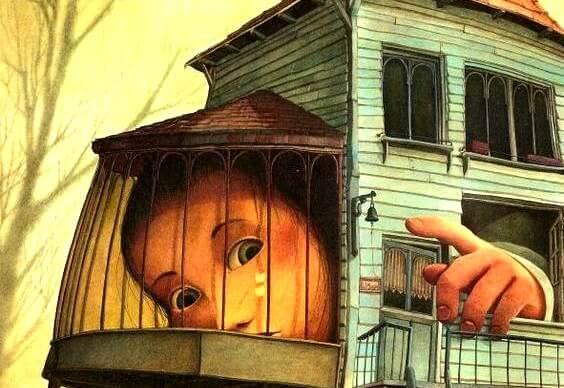Judging Others: A Trap We Set for Ourselves

We have all fallen into the terrible trap of judging others at some point. But, what do I mean when I call this bad habit a trap? Ever time that we make a judgment about someone, we become people who create stories which may be very far from reality.
Imagine a mother who always drops her son off to school late. Perhaps we start to judge her as a bad parent, or someone lazy and likes to sleep in. Perhaps we think she is too disorganized. Have you stopped to ask yourself if any of this is true? Sometimes the simplest explanation is the one that’s true.
People are quick to judge others, but slow to correct their own behaviors.
Without realizing it, you are assuming what goes on in that person’s life. You are falling into the trap of filling in unknown information with a story you made up. You are making a mistake with out realizing it. We all have to put on a pair of glasses like the man in this video:
Our ego is to blame for judging others
The reason we judge others in this way is our own ego. Consciously or unconsciously, we feel better about ourselves. However, by judging others, we close the door to empathy.
When we speak of empathy, many of us say “Of course I am empathetic. If a friend needs a shoulder to lean on, I am able to put myself in her place and understand why she is feeling this way without being tempted to judge her.” It’s true, you are empathetic, but only with people you know. With people you don’t know, you fall into the trap.

We want to feel superior, special, distinct. We prefer to observe the people we judge from a distance. We like it this way because it makes us feel better about ourselves.
“The size of a person’s ego can be measured by how it handles the mistakes of others.”
Have you ever felt isolated because no one understood you? You’ve probably thought to yourself “If they only knew what I was going through. . .” at least once in your life. The people you are judging are probably thinking the same thing. Is there situation really that different from your own?
Furthermore, imagine that you are right in your judgement and the other person is acting poorly. Who are you to judge? You don’t know what their life has been like up to this point. None of us is perfect. We all have the right to make mistakes.
If you don’t know, ask
Let’s return to the example of the mother that always drops off her kid late. Perhaps she has an abusive spouse, she suffers from depression, or a dear family member has recently died. We don’t like these explanations as much because they force us to get involved. They knock at the door of our conscience.
We don’t live their lives. We have our own things that make life difficult. Perhaps this is why we feel better when we see where others are weak.
If someone has acted so poorly, in your opinion, that you point them out , why not ask about their behavior? If you were in their place, you would probably want someone to ask rather than judging. What would happen if everyone judged but no one showed caring or compassion?
Maybe reaching out to the person and asking questions will be the start of a beautiful friendship, or simply a situation in which you can lend someone a hand. I’m sure, if roles were reversed, you would want the same thing. You would want someone to reach out, rather than silently judge you from a distance.

Nevertheless, it is scary to reach out and ask. To do so, our judgements must fall apart. We have to dismantle the series of stories and judgements we have made up about the person and this might affect our ego. We must protect ourselves from falling into the worst trap of all: constantly criticizing.
Judging a person doesn’t define them, it defines you.
We can easily fall into the trap of judging others. We judge others almost without thinking. We have to start showing interest in the well-being of others, even if it just so we can find an explanation about their behavior rather than inventing our own. We need to have patience with others and try to build common ground.
We have all fallen into the terrible trap of judging others at some point. But, what do I mean when I call this bad habit a trap? Ever time that we make a judgment about someone, we become people who create stories which may be very far from reality.
Imagine a mother who always drops her son off to school late. Perhaps we start to judge her as a bad parent, or someone lazy and likes to sleep in. Perhaps we think she is too disorganized. Have you stopped to ask yourself if any of this is true? Sometimes the simplest explanation is the one that’s true.
People are quick to judge others, but slow to correct their own behaviors.
Without realizing it, you are assuming what goes on in that person’s life. You are falling into the trap of filling in unknown information with a story you made up. You are making a mistake with out realizing it. We all have to put on a pair of glasses like the man in this video:
Our ego is to blame for judging others
The reason we judge others in this way is our own ego. Consciously or unconsciously, we feel better about ourselves. However, by judging others, we close the door to empathy.
When we speak of empathy, many of us say “Of course I am empathetic. If a friend needs a shoulder to lean on, I am able to put myself in her place and understand why she is feeling this way without being tempted to judge her.” It’s true, you are empathetic, but only with people you know. With people you don’t know, you fall into the trap.

We want to feel superior, special, distinct. We prefer to observe the people we judge from a distance. We like it this way because it makes us feel better about ourselves.
“The size of a person’s ego can be measured by how it handles the mistakes of others.”
Have you ever felt isolated because no one understood you? You’ve probably thought to yourself “If they only knew what I was going through. . .” at least once in your life. The people you are judging are probably thinking the same thing. Is there situation really that different from your own?
Furthermore, imagine that you are right in your judgement and the other person is acting poorly. Who are you to judge? You don’t know what their life has been like up to this point. None of us is perfect. We all have the right to make mistakes.
If you don’t know, ask
Let’s return to the example of the mother that always drops off her kid late. Perhaps she has an abusive spouse, she suffers from depression, or a dear family member has recently died. We don’t like these explanations as much because they force us to get involved. They knock at the door of our conscience.
We don’t live their lives. We have our own things that make life difficult. Perhaps this is why we feel better when we see where others are weak.
If someone has acted so poorly, in your opinion, that you point them out , why not ask about their behavior? If you were in their place, you would probably want someone to ask rather than judging. What would happen if everyone judged but no one showed caring or compassion?
Maybe reaching out to the person and asking questions will be the start of a beautiful friendship, or simply a situation in which you can lend someone a hand. I’m sure, if roles were reversed, you would want the same thing. You would want someone to reach out, rather than silently judge you from a distance.

Nevertheless, it is scary to reach out and ask. To do so, our judgements must fall apart. We have to dismantle the series of stories and judgements we have made up about the person and this might affect our ego. We must protect ourselves from falling into the worst trap of all: constantly criticizing.
Judging a person doesn’t define them, it defines you.
We can easily fall into the trap of judging others. We judge others almost without thinking. We have to start showing interest in the well-being of others, even if it just so we can find an explanation about their behavior rather than inventing our own. We need to have patience with others and try to build common ground.
This text is provided for informational purposes only and does not replace consultation with a professional. If in doubt, consult your specialist.







